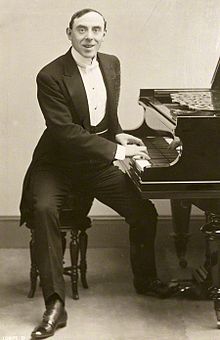Harry Fragson
Harry Fragson (born July 2, 1869 in London as Victor Léon Philippe Pot , † December 30, 1913 in Paris ) was a singer, comedian and author of various songs who was equally successful in France and England. He has performed in café concerts and music halls in Paris and London. He was shot dead by his senile father when he was 44 years old.
biography
Harry Fragson was next to Félix Mayol , Dranem and Polin as one of the most famous singer-songwriters of the turn of the century. He liked to claim that his parents were French. The publication of an excerpt from his birth certificate in 2004 brought clarity to his biography: He was born in Soho (London) in 1869 to a father of Belgian origin, the hotelier Victor Pot ("Vince"), and the Belgian cook Leontine Winand . He grew up bilingual.
He studied trade in Antwerp and in his free time played current hits on the piano to his friends. When he fails the university exams, he tries his luck as an artist in Paris. He auditioned at a café-theater, which organizes the annual dance event Bal des Quat'z'Arts (Ball of the Four Arts) and was hired as a musical accompanist.
First he chose Harry Frogson as his stage name . When the director of the theater, who also spoke English, pointed out with a smile that this literally meant “son of a frog”, he changed the first vowel.
So began his successful career in the music halls in France and England. He attracted attention with a performance that was new at the time, in that he accompanied himself on the piano with a rich repertoire of songs ranging from comedy to romance. His most successful songs are La Boiteuse , Reviens, veux-tu , Les Amis de Monsieur , Je connais une blonde and Si tu veux Marguerite .
death
Fragson brought his senile father from London to Paris to look after him. Everyone observed that the relationship was very harmonious. One day after a meal, Fragson returned to his apartment at 56 rue Lafayette, where his 83-year-old father also lived. He found the door locked and coveted entry, which he was granted shortly afterwards. It looked like his father wanted to commit suicide because he felt increasingly neglected. In addition, a few months earlier, Fragson met a young woman with whom he spent a lot of time. In the argument that followed, the old man shot his son in the head. To the chambermaid who came in shortly afterwards, he said: “ I shot him. Because he's a criminal. ". However, he told the police that it was a mistake trying to kill himself (his son tried to stop him). Fragson died shortly before reaching the Lariboisière hospital . He was only 44 years old. The funeral ceremony in and in front of the Notre-Dame-de-Lorette church was pompous and was attended by a large number of people and prominent artist colleagues. Film recordings were also made. His father died in an asylum six weeks later .
After his death, his half-brother and his family claimed the inheritance, but because of the lengthy process, the entire inheritance ultimately fell to the French state. Fragson owned several luxury residences, items of great value, the copyrights to his songs, and he was one of the Panama Canal's largest shareholders . His fortune amounted to £ 80,000 in addition to the payout of his life insurance (actually in favor of his father) of £ 20,000 ( today's purchasing power would correspond to both together in about 12.5 million euros )
Works
- Je connais une blonde (based on There's a Girl in Havana by Irving Berlin )
- Les Blondes
- La Mouyette (based on La Matchiche by Félix Mayol )
- Le Thé Tango
- Les Jaloux
- Reviens, veux-tu
- Tendresse d'amant
Discography
- Compilation 1903-1912 , Collection Chansophone, 1994
The singer Barbara paid homage to Fragson in 1981 on her album Seule .
Film excerpt from Entente cordiale
Max Linder
Link to the film
(please note copyrights )
Filmography
- In 1904 he made the film "Le Raid Paris - Monte-Carlo en automobile" with Georges Melies .
- In 1912 he and Max Linder shot the short film Entente cordiale, the story of two friends who are competing for the favor of a woman ( Jane Renouart ). It premiered on November 22, 1912.
bibliography
- Andrew Lamb and Julian Myerscough, Fragson, the Triumphs and the Tragedy , Fullers Wood Press, 2004, ISBN 978-095241494-0
Individual evidence
- ↑ Biography in French
- ^ Steven Moore Whiting, Satie the Bohemian: From Cabaret to Concert Hall , Clarendon Press, 1999, p. 15
- ^ New York Times, December 31, 1913
- ↑ Eyewitness accounts of his funeral In Du Temps des cerises aux Feuilles mortes , French
- ^ Advertisement in the Sydney Morning Herald of January 5, 1914
- ↑ Currency converter
| personal data | |
|---|---|
| SURNAME | Fragson, Harry |
| ALTERNATIVE NAMES | Pot, Victor Léon Philippe |
| BRIEF DESCRIPTION | English-French singer-songwriter |
| DATE OF BIRTH | July 2, 1869 |
| PLACE OF BIRTH | Soho (London) |
| DATE OF DEATH | December 30, 1913 |
| Place of death | Paris |

